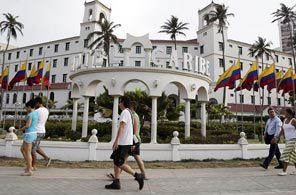Holly Smith, the writer of this article, was a victim of child sex trafficking and is making noise so more action is taken. There have been an increasing number of human trafficking cases within the past six months. The Eastern District of Virginia has had several cases alone, some of which were linked to differing gangs. The tactics vary but most go for children with a similar predisposition. Even though there are more cases being reported, does that mean it is expanding or getting more exposure? I believe it is both. If more efforts are not developed for the prevention and rehabilitation of human trafficking, it is going to become a more prominent threat. Smith says that Virginia is not the exception but the rule.
I completely agree due to the misinformation that our society has generated around prostitution. The statistics show that religious orientation does not deter followers of different faiths to employ prostitution services. People see it as a negative aspect of culture but it is the prostitutes right to sell her body within a ‘free,’ capitalist society. People do not realize that they are not enacting their rights but a trafficker’s demand. The male buyer (the ‘John’) usually does not realize the processes and situations the prostitute has been forced through (The ones that do realize would not have the allowance to attend ‘John School’, a topic for the next blog.) One of the main issues is that the American middle class has suffered due to the economic recession. It is within these times that more people are capable of manipulating the inhabitants through a variation of means.
Look at two very prominent examples, Asia and Russia. Russia started increasing trafficking after the collapse of the Soviet Union. Asia’s market collapse created a wave of poverty and desperation, a traffickers dream. The country’s economy was suffering and people were desperate to get jobs and stability. Since there is a need for money, many women seek employment through agencies promising jobs in foreign countries. Though there are legitimate agencies that allow what the girls are hoping for, it is not always the case. Traffickers are able to lure girls into prostitution by employing various methodologies [servile marriage, prostitution]. So we have to teach them young, right? Let’s stop cutting school budgets and introduce new programs that help human trafficking awareness and prevention through direct and indirect means.
M.S., another survivor of human trafficking, tells her story and how her teachers were a beacon of hope. The issue is that teachers and social workers typically do not know the criteria or understanding to identify a victim of sex trafficking. Virginia has implemented a program to teach teachers and social workers the skills to identify and converse with a trafficked victim.
If a person does not know the right questions to ask, it very difficult to identify the case as human trafficking due to their mental ailments induced by the trafficker.
The traffickers use this to their advantage, utilizing the police force as an inhibitor by turning in the victim and forcing them to stay in jail for months at a time. It is commonly known that in the U.S. [NV excluded], prostitutes were arrested with the charge ‘crime against nature.’ The way the media has portrayed prostitutes is not helping those that are forced into its dark, daily routine. We all need to work hard to get programs like Virginia’s in North Carolina!
As the video “The Quest to End Child Trafficking” states, advocacy groups and grassroots are the most auspicious for change in human trafficking laws and the rehabilitation of its victims. Let’s work together and make this community one where prostitution and trafficking is no longer prevalent. There are many things you can do to help the battle against modern-day slavery. Support programs, buy fair trade items, talk to a friend about human trafficking and research the issues and threats in your area!
NCGS Chapter 14 Article 10A: The definition and ramifications of human trafficking in NC
Article read by and inspired:
Peter Wilson
ENC Stop Human Trafficking
Intern [Anthropology]



